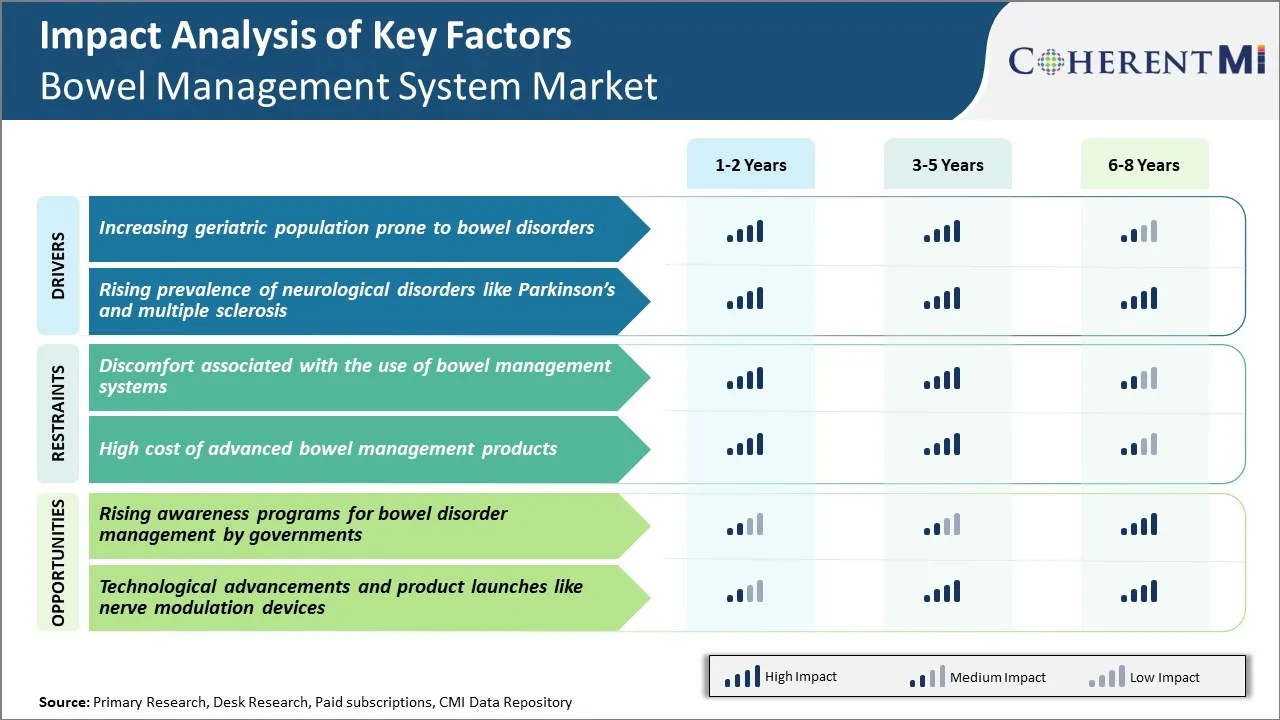Bowel Management System Market Trends
Market Driver - Increasing Geriatric Population Prone to Bowel Disorders
With increasing life expectancy and ageing population across the globe, geriatric population above 60 years has seen a steep rise. As people advance in their age, they become more vulnerable to various medical issues and ailments. Bowel disorders are quite common in elderly people owing to age related physiological changes and weakening of muscles in the gastrointestinal tract.
Conditions like constipation, hemorrhoids, diverticulitis and fecal incontinence prevail amongst the seniors. Constipation, in particular plagues many older adults causing them discomfort and reduces their quality of life. With bowel muscles becoming weak and nerve supply diminishing with advancing age, elders find it difficult to empty their bowels completely and regularly. Their mobility also restricts as they grow frail making them sedentary and less active which aggravates the problem.
Devices ranging from enemas to laxatives to colostomy bags are extensively used amongst the elderly population prone to constipation and fecal incontinence issues. With life expectancy rising globally, the dependency ratio of dependents to working population is projected to increase substantially in coming decades. This will continue pushing the sales volumes of adult diapers, ostomy accessories and mechanical bowel cleanout systems intended for the geriatric population segment.
Market Driver - Rising Prevalence of Neurological Disorders Like Parkinson’s and Multiple Sclerosis
Conditions like Parkinson's disease and multiple sclerosis severely hamper mobility while also interfering with normal functioning of bowel and bladder. Parkinson's disease is a progressive disorder of the nervous system affecting movement. One of its symptoms is constipation resulting from reduced activity in the muscles of the gastrointestinal tract. Medications used to treat Parkinson's tend to worsen the problem further.
Similarly, multiple sclerosis, an autoimmune disease that impact the central nervous system often leads to bowel problems in patients. Weakness and spasticity of bowel muscles due to nerve damage in multiple sclerosis causes constipation and incontinence affecting quality of life.
It is estimated millions of people are affected by these chronic progressive disorders worldwide. This has created demand for dedicated assistive products that can help patients deal with bowel dysfunction as a result of their medical condition.
Various bowel management accessories and mechanical cleaning devices specifically tailored to needs of neurological patients have gained ground. Their dependence for bowel movement aid is increasing as severity of bowel complication rises with disease progression. This growing neurological patient pool suffering from associated bowel issues is a key factor driving the bowel management system market in recent years.

Market Challenge - Discomfort associated with the use of bowel management systems
One of the major challenges faced by the bowel management system market is the discomfort experienced by users with existing products. Many traditional bowel management systems involve the use of rectal catheters, suppositories or enemas which can cause pain, irritation and embarrassment for patients.
The insertion process itself often requires manual probing which many find uncomfortable. The catheters also need to be changed regularly which disrupts daily activities. This induced discomfort acts as a deterrent for patients and leads to low compliance in using bowel management aids.
Product developers still have a long way to go in engineering solutions that can effectively clear blockages without subjecting users to pain or hassle. Making bowel management simpler and more pleasant will be critical to address this challenge and drive future adoption.
Market Opportunity - Rising Awareness Programs for Bowel Disorder Management by Governments
There is a significant opportunity for the bowel management system market through the various awareness initiatives undertaken by governments globally. Several countries have implemented national programs to educate citizens and healthcare providers about the prevalence of bowel disorders like fecal incontinence. They are training doctors to properly diagnose conditions and ensuring insurers cover prescribed treatment costs.
At the same time, public health organizations are actively creating awareness through online resources, social media campaigns, pamphlets and meet-ups focused on normalizing conversations around bowel health issues. Such widespread information dissemination is helping remove social stigma and encouraging more patients to seek medical supervision.
As a result of these awareness programs, the market is witnessing higher commercialization of new products tailored for long-term disorder management at home. This rising attention on bowel health by authorities bodes well for sustained growth of the bowel management system industry in the coming years.